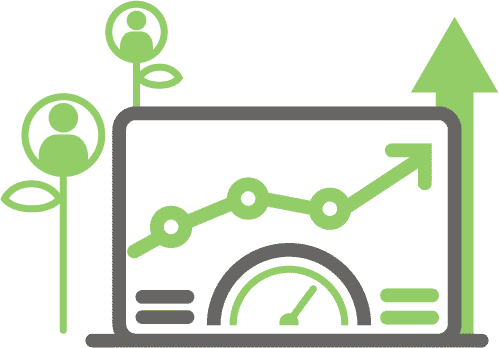SEO for Personal Injury Lawyers

- Author: Jon Robinson | SVP Digital Media
- Updated date: April 1, 2024
- SEO Basics for Personal Injury Law Firms
- Why is SEO important for law firms?
- How does Google rank attorney sites?
- Is PPC or social media better than SEO?
- The Most Important Ranking Factors for Personal Injury SEO
- Can Your Personal Injury Website Pass an SEO Audit?
- Keyword Research & On-Page SEO
- Local SEO for Personal Injury Law Firms
- Link Building for Attorneys
- Paths for Personal Injury Law Firms Seeking Better Organic Traffic
Long lost are the days of old-school marketing tactics for personal injury law firms, as the law is also modernizing its practices and entering the digital age. Law libraries and lawyers’ offices have walls that remain lined with ornate bookcases adorned with legal manuals, state and federal mandates, case law, and other oversized statutory guidance and dictates. Yet, courts and legal affiliates enable online filing, legal research, customer databases and dockets, and now, marketing to make lawyers’ lives a tad more manageable, help them keep up with the times, remain accessible to their clients and equipped to meet their needs adequately and efficiently.
The problem is, marketing takes time, and online marketing requires a degree of skill, too. Advertising your firm or legal practice goes beyond simply creating a website and waiting for the masses to find you. With the rise of social media and online advertising options, not only do you need to know the latest advances in law, but also in marketing. Various social platforms and search engines are teeming with potential clients, but you need to know how to reach them.
Additionally, with everyone now able to connect via any number of electronic devices in literally milliseconds, you need to differentiate yourself. You don’t want to be just another face in the crowd, meaning you need valuable, well-written content coupled with a top-notch legal search engine optimization (SEO) strategy.
You cannot accomplish this on your own. Advocating for your clients is often a full-time-plus job. Hiring someone internally requires interviewing, training, oversight, and a weekly or bi-weekly paycheck with benefits. Also, it usually takes more than one person to handle the time-consuming and challenging demands of an effective, SEO-saturated online marketing initiative. That’s why recruiting a team of marketing experts with specialized experience working with law firms can be beneficial for your legal practice.
SEO best practices can put you and your firm on the map, and new business will inevitably follow. Let CAMG market you or your law firm using our knowledge and experience, and you can continue running your business, investing in what matters most to you—your clients—while reaping the rewards of a robust new client pool that can benefit from your legal expertise.
SEO Basics for Personal Injury Law Firms
SEO is what drives traffic to your website. Without it, you virtually don’t exist to your audience attempting to find you online. SEO involves more than just inputting the proper keywords. Content is paramount to the success of your SEO efforts, but you also need to consider your users’ experience when visiting your website. The design, maneuverability, functionality, readability and conversion paths must be on par to provide your site visitors with an informative and easy-to-use encounter. The ease and competence of your website can make or break a lead’s likelihood to convert to a client.
You also need to consider if your website is mobile-friendly, secure and has fast loading times. Finally, you’ll need to build links from other authoritative industry leaders to boost the credibility and authority of your own site and material. To do so, you’ll want your content to provide a high level of expertise, authority, and trust, be original, engaging, knowledgeable, and valuable, and yes, you’ll want those keywords to be on point!
SEO isn’t something you can fake until you make it. Rather, it’s something that requires strategy and intention to really master. Just like someone in a legal situation needs an attorney to best equip themselves and better their outcome, someone looking to maximize their organic (unpaid, long-term) marketing efforts by implementing SEO techniques needs an experienced team of professionals whose lifework is SEO to get the job done well.

SEO done right
Our SEO team is the best in the legal industry. We rank national and local firms for PI, MVA, mass tort, family law and more. Contact us today for a complimentary audit and program to generate you more cases at a highly efficient cost per case.

CAMG Ethics White Paper
Our Services
Are you looking for data-driven marketing for your law firm?
I have worked with CAMG for years. Not only are they great at delivering, but they are great people to work with!

CAMG is always accommodating and willing to work in a way that supports your office as an extension of your team.

Steve Nober and the team at CAMG are responsive, ethical, talented, reasonably priced, and easy to work with!

If you are looking for professional, hardworking people who produce great results and then take you out for a nice dinner, look no further than CAMG

Why is SEO important for law firms?

SEO is vital for anyone wanting to succeed professionally, especially in a saturated space. But despite the statistics, many law firms and solo practitioners still aren’t capitalizing on website traffic. In fact, 40% of small firms report not even having a website, and out of those who do, 35% haven’t updated their online presence in the last three years. Moreover, while 87% of law firms overall report having a website, only 59% of solo practitioners can say the same.
These stats are especially troubling because 70% of law firms are getting new cases via their website. If you don’t have one or your audience can’t find your website because it’s outdated, you’re missing out on potential clients, as well as accompanying fees and increased revenues. Research shows that a lawyer’s top three challenges include difficult clients (22%), long hours (18%), and finding new clients (17%).
The legal industry is competitive, with over half (51%) of law firms and lawyers now using social media to build their client base. It takes a mere six or seven minutes to share content, post updates, connect with followers and influencers, and reply to comments and questions. Still, many personal injury law firms aren’t investing in their online audience like they should, with data showing 32% of potential clients not expecting to hear back from a law firm after attempting to make contact.
Lastly, 22% of your leads give up on seeking legal assistance simply because they don’t know where to look. Again, it’s up to you to show them where you are and how your personal injury law firm can help.
How does Google rank attorney sites?
Google uses crawlers to sort through billions of web pages to find what users are searching for as quickly and efficiently as possible. Google search algorithms consider the following factors when yielding results:
- User queries (i.e., keywords and meaning)
- The relevance and quality of content
- The usability and speed of webpages
- The credibility and authority of a site and its sources
- User location, settings and search history
These algorithms are constantly evolving to improve users’ search experiences, providing them with the most up-to-date, quality, and relevant information nearly instantaneously at the touch of their fingertips to digital screens or keyboards.
Your website’s rank on Google search results is important primarily because ranking scores you more traffic and a higher click-through rate (CTA), meaning more leads, more clients, more fees, and more profits. Data shows that 93% of online experiences begin with a search engine, and Google currently holds 92.2% of the global search engine market share, with 94% of all mobile and tablet search traffic originating from the tech giant’s platform.
Lastly, 75% of users never scroll past the first page of search results. So, where you’re ranking can make all the difference when your audience logs online to start searching for you as a solution to their legal problem.
If you’re hoping to boost your law firm’s position in response to user search queries, you need to focus on the following Google ranking factors:

Quality Content
Content is key to the success of your website

Internal Linking
Internal links are links from one page of your website to another relevant page on your site

Backlinking
Backlinks are links from another company’s or person’s website to yours, also known as inbound links or external links

Website Loading Speed
Users spend on average less than one minute on search sessions

Mobile Friendliness
People’s phones rarely leave their sides

Author E-E-A-T
Experience
Expertise
Authority
Trust
Is PPC or social media better than SEO?
In short, no. However, both paid online advertising and social media can be excellent compliments to a well-thought-out, organized, and rightly implemented legal SEO strategy. The data shows that people seek authenticity more than a sales pitch. Therefore, organic marketing should be your priority, with statistics revealing between 70-80% of users ignore paid search results and ads. Additionally, while social media is great for exposure and building your online presence, search engines prove more valuable, with stats showing they generate 300% more traffic to websites than social platforms.
Don’t completely dispel paid online advertising or pay-per-click (PPC) advertising, though, because marketers reported that when used with organic SEO methods, PPC ads yield an average of 25% more clicks and 27% more profits than any single marketing initiative. Social media is also a great place to share your content and engage with your audience in real-time.
The Most Important Ranking Factors for Personal Injury SEO
Content takes precedence when you’re deciding what’s most important for your firm’s marketing plan and SEO strategy, but it’s not the only tactic to consider when rounding out your long-term scheme. To maximize your SEO efforts and create a thriving organic marketing campaign, you should focus on the following ranking factors for personal injury SEO:
Authoritative Content & Authors
User Experience (UX)
Internal Linking & Site Architecture
Images & Videos
Quality Backlinks
Ways to build authority or trust within the world of Google include:
- Create useful content
- Make your content easily accessible and readable (i.e., consider your website design and structure)
- Gain legitimate and effective backlinks (don’t cheat the system)
Law firms rarely accumulate a wealth of earned links. Instead, content and web design should be your primary focuses to gain authority within the legal industry.
Can Your Personal Injury Website Pass an SEO Audit?
An SEO audit can give a good idea of where you’re currently ranking and how to improve your processes to increase website traffic, conversions, and law firm revenues. SEO audits include:
Technical Audit
An SEO professional can complete a technical audit with the aid of industry tools, including SEMRush, RavenTools, Page Optimizer Pro, SpyFu, WooRank, AhRefs, and Cora SEO. Technical audits check for the following:
Crawl errors: These site errors prevent search engine bots from finding your website due to an inability to communicate with your server.
Indexing: Determining if your website is indexed is as easy as googling your domain name to see where you rank in search results. Indexing issues happen when you have blocked pages or when Google isn’t certain if a page should be indexed.
Hosting: Hosting ensures quick access to your website anytime from anywhere. It’s a “home” base of sorts to enable fast and reliable connection. You should also implement a CDN (content delivery network) to improve site speed.
Broken links: Broken links can diminish your credibility, thereby lowering the ranking power of your site. Therefore, it’s important to correct these dead links by directing users to the correct URLs.
Minifying CSS: By minifying CSS and other website resources or unnecessary code, you can optimize website performance and improve loading speeds.
General maintenance: A technical audit should provide you with an overall evaluation and assessment of your website performance, identify strengths and weaknesses, as well as offer recommendations for improvement.
Google’s Page Experience Update launched in June 2021, introducing new page ranking signals called Core Web Vitals to its algorithm. The intent behind the update is to essentially reward those brands that consistently provide their users with quality UX or user experience. Google recommends a site-wide audit to prepare for the update.
The Core Web Vitals or three main ranking factors include:
- Largest Contentful Paint (LCP): measuring loading performance or how long it takes content “above the fold” to load
- First Input Delay (FID): measuring interactivity or how long it takes a user to interact with your site
- Cumulative Layout Shift (CLS): measuring visual stability or how long it takes elements on a webpage to fall into place
On-Page Content Audit
After squaring away the technical issues, you need to look at your on-page content. This type of audit is an in-depth analysis and assessment of your current website content. It looks at keyword research, competitor analysis, content site architecture, and metadata, aiming to reveal strengths and weaknesses in your existing content strategy so that you can adjust and plan successfully moving forward and even effectively revive old content.
Steps to take to properly assess your content’s relevance, value and performance include:
- Rank pages in order of importance (likely by traffic and conversions). Discover what pages are performing best and why. Perhaps those pages cater to your audience most effectively, or maybe they contain more explicit calls to action. Whatever the reason, determine which pages are getting not only the most traffic but ultimately the most conversions, and learn what you’re right on those pages to identify what you’re doing wrong, or what you could do better elsewhere.
- Determine the focus for each page. You need a clear objective for each page, so your content is focused, organized, and useful to your audience. Content briefs are great tools to provide your writers with an outline of how the content should flow and what points they’ll need to address. If you can’t think of a reason to have the content, you probably don’t need it. Each piece of content should help to further your firm’s objectives. At CAMG our content process always includes a thorough brief so our writers know exactly how the page should be written.
- Analyze what is working in the search results. Guides might be longer than blog posts, and videos might be shorter than podcasts. Results can change over time based on user intent and trending topics. Make sure your target pages are focusing on what Google is ranking well today for your target keywords.
- Optimize internal linking. To create internal linking opportunities, you have to first have lots of linkable content. Your internal linking strategy should also organize your content so that it presents several natural routes across your website. Your most important pages should have the most internal links with properly optimized anchor text.
- Audit Calls-to-Action (CTAs). Your calls to action need to be clear, strong, concise, and natural. They should also stand out and appeal to your reader’s emotions, influencing them to take immediate and directed action.
Keyword Research & On-Page SEO
After finding your focus pages, you need to determine the focus of those pages in keyword terms. When selecting keywords for your legal content and website, you need to consider both search volume for specific queries and keyword difficulty to determine how likely it is you’ll be able to optimize your web pages to rank for specific keywords or phrases.
Some target keywords necessitate their own page, while other keywords and phrases can be captured within a broader page topic.
Conducting Keyword Research
Keyword research and focus help your law firm target the appropriate audience and possible leads by telling them exactly what they should expect when hiring you for your services. When you’re focusing your keywords, you’re ranking higher and pulling in the clients relevant to your practice to increase your workload and revenues.
Keyword research tools can help you decide on the best keywords for your business. You should conduct keyword research regularly to keep your site fresh and relevant. If you add a new service, location, or another change happens (e.g., new laws pertaining to your area of practice), you can update accordingly. Freshness is a ranking factor!
Measuring different metrics (e.g., page clicks, impressions, etc.) can help you evaluate and determine what’s working best and what needs adjusting. You might need to update content based on keyword performance. Never resign to a polished piece, not expecting to tweak it at a future time.
Keyword research tools to choose from include:




Keyword research tools also enable you to check out your competition. Knowing where you stand with your competitors, who’s ranking well and what they’re ranking for, and whether you want to rank for the same or different keywords can help you better structure your site and create your content to excel.
When doing keyword research, your law firm should consider a variety of keywords based on research. What are users searching for? What questions are they asking? How are they searching for your brand?
Local SEO for Personal Injury Law Firms
To get more local clients, you need more local SEO. For example, most people searching for a lawyer nearby start with a Google search for “lawyers near me,” and many local attorneys and law firms are vying for the top-ranking positions to knock out their neighboring competition. Local SEO is the practice of using geo-specific keywords (e.g., cities, neighborhoods, etc.) to help people find your website for a localized region by ranking for those exclusive area searches.
Lawyers typically represent clients within limited physical vicinities, making local SEO even more important. Using local keywords also helps to narrow your competitive efforts for ranking.
Ways to Improve Local Listings
There are several ways to optimize your legal site to attract local clients, including:
Google Business Profile
Google Business Profile (formerly Google My Business) is a Google-provided listing that provides a digital presence for your business and helps you rank in Google Maps. This service is free and easy. All you have to do is complete your listing by providing your business information, including address, services, business hours, phone number, website URL, business photos, and offers or other unique identifiers. Optimize this profile to start ranking above your local competition in Google Maps. Be sure to set your primary category to Personal Injury Attorney.
Local Directories & Citations
Citations help Google understand your business entity's relevance and authority both locally and within your areas of practice. We recommend at least 100 citations as table stakes and over 200 for major markets. These must accurately match your Name-Address-Phone Number (commonly referred to as the NAP) on your Google Business Profile and your website.
Reviews
Ask your satisfied clients to leave reviews on your Google My Business listing, other local directories, and social media pages. When potential clients search for you and see your collection of positive reviews, they’ll be more likely to click on the links leading to your website. In addition, reviews can boost your credibility by letting your audience know you are open for business and able to meet their legal needs and produce favorable outcomes.
Aggregators
A local data aggregator pulls information about businesses and then shares that data with other sources for use in mobile apps, on citation sites, on maps, and to create business directories. Any business can create an account and use a data aggregator, including Data Axle and Neustar Localeze.
Link Building for Attorneys
Link building is so important to your site’s overall ranking, but you have to do it right. Proper link building practices can provide you with a solid and authoritative online presence. High-quality and relevant links pointing to your website let potential clients know that not only do you exist, but you’re worth their search time, driving more traffic to your site, and ultimately leading to increased conversions based on heightened trust in your brand. Google uses authoritative and relevant links as “votes”. Content and backlinks are the two most important factors when it comes to ranking your website on Google.
Buying and soliciting links, though, or engaging in black hat link building strategies can actually harm you, setting you back in your efforts to be a ranking and valuable source for users needing your legal services.
Marketers adopting black hat link building practices might post comments linked to their website on third-party sites. The link might have little to do with the subject matter of the post. Additionally, black hat link builders might become entangled in creating link farms, blog networks, or websites designed purely to list links with no content or usefulness for their visitors.
Some of these shady maneuvers might get you clicks in the short term, but in the long term, Google will expose your underhanded schemes and ding your site accordingly. Plus, you’re not producing the credible standards or high-quality content you want your audience to be accustomed to and associate back to your firm. Quality is always better than quantity.
The idea of purchasing links is fairly self-explanatory, but black hat link builders engage in spam-related tactics to garner brand awareness that just comes across as tacky and desperate. It adds no real value or substance to your site and ranking status.
Marketers adopting black hat link building practices might post comments linked to their website on third-party sites. The link might have little to do with the subject matter of the post. Additionally, black hat link builders might become entangled in creating link farms, blog networks, or websites designed purely to list links with no content or usefulness for their visitors.
Some of these shady maneuvers might get you clicks in the short term, but in the long term, Google will expose your underhanded schemes and ding your site accordingly. Plus, you’re not producing the credible standards or high-quality content you want your audience to be accustomed to and associate back to your firm. Quality is always better than quantity.
In December 2022, Google released the Link Spam Update which targeted sites manipulating rankings by buying links and selling links. If your SEO agency is telling you they can deliver a set amount of links each month, they may be purchasing them from link networks or placing them on a network of guest posting sites. These types of tactics are exactly what Google says you should not do.
Link Building Opportunities
Link building opportunities for your legal practice include:
Lawyer Listing Sites
Lawyer listing sites or directories are typically your lowest value manual links because they’re available to all solo practitioners and law firms, but that’s also why you should take advantage of them. Popular sites include:
- FindLaw.com
- Avvo.com
- Nolo.com
- Justia.com
- LegalZoom
- Lawyers.com
- Martindale.com
- Superlawyers.com
- Best Lawyers
- Lawinfo.com
- Legalmatch.com
- LawGuru.com
- LawyerLegion.com
You should also consider listing on Hg.org, Yelp.com, NextDoor, and Thumbtack.com. Yelp is an excellent resource for local traffic, and although Hg.com does not enable visitors to follow links, they do get a lot of users passing through. Thumbtack ranks well for many attorney keywords.
These types of directory listing citations are mainly used for their Google Business Profile prominence and relevance value. The more accurate references your firm has to its NAP (name-address-phone), the more positive signals you’re sending to Google.
Guest Posting
Guest posting is one of the most effective ways to build backlinks, but beware the ramifications if you are utilizing guest posting as a linkbuilding tactic! Accessing another person’s audience interested in your firm inevitably expands your exposure. Additionally, if someone vouches for you, that boosts your credibility and their trust in your brand, or in this case, your legal expertise. However, Google has explicitly stated that guest posting for links is against their guidelines, which is why CAMG does not engage in guest posting as a link building practice.
Community Charities or Efforts
This outside-the-box link building tactic is good for business and the community and brings needed awareness to local causes. As you get the word out about noteworthy charities, they’re ensuring that people see your involvement, bringing attention to your legal practice and services.
You can also act as a sponsor to non-profit events, gaining not only a link back to your website on their event pages but your name on promotional materials. Attaching yourself to the community signals search engines about your local connection and contribution, leading to increased traffic and potential future clients.
Many law firms and SEO agencies engaged in a practice known as Scholarship Link Building, which involved creating a scholarship with the sole purpose of generating backlinks from other websites. This spammy tactic has been noted by Google as a manipulative tactic, and they have devalued links and penalized sites for this practice. I have personally seen many websites see initial success with scholarship link building, only to see the site plummet in the rankings after Google detects this manipulative tactic. A reputable legal SEO agency should never suggest a scholarship to generate backlinks.
Testimonials/Reviews
Testimonials and reviews from former or current clients can help influence others searching for legal representation. Hiring a lawyer is a big deal due to the cost of services and the trust a person places in their legal counsel to advocate for them adequately. Hearing from someone else about their experience with a particular attorney can help sway a potential client who’s on the fence. It can also ease any concerns they have and answer some questions about what they can expect.
Most marketers are aware of the benefits of consumer testimonials and reviews to improve services and processes and build trust and credibility with incoming clients, but few recognize its value as a link building opportunity. Each new testimonial or review that goes up on your behalf alerts search engines to your website updates, providing new crawling opportunities moving you up in rank. Additionally, these customer contributions can rank you for relevant keywords, further improving your site authority and search results placement.
Paths for Personal Injury Law Firms Seeking Better Organic Traffic
There are really only two ways to increase organic traffic to your website:

Do It Yourself
You can refer to this guide and use dynamic SEO-related tools to improve your site’s rank, attract more visitors, and garner more conversions. Keep in mind that SEO is a full-time job. It’s iterative and time-consuming, requiring both skill and commitment. If you’re a dedicated player or have several devoted assistants at your disposal with know-how and resolve, it’s possible to make it work, but you’ll need to adopt a systematic and adaptive approach. You’ll also need to be open to learning and evolving as digital marketing and SEO undergo constant changes.
It may be beneficial for you to hire an in-house team of SEO specialists who can work together to write your content, post on social media, and use analytics programs to monitor and measure your SEO performance continually. Sometimes, having a team dedicated solely to your firm effectively gives your website and clients the time and attention truly deserved via employees who have a personal and vested interest in your firm’s success.
CAMG works alongside in-house marketing teams at firms across the country to supplement in-house efforts and scale your firm’s digital efforts.
Hire an SEO Consultant or Agency
Another route that’s likely more cost-effective and time-saving is to hire a consultant or legal marketing agency, like CAMG, to do the work for you. Our comprehensive SEO program provides unique and dynamic reporting and analysis of real-time marketing data to help rank your firm in the Google Search results and maintain your prime position, situating you above your competition where your audience can easily find you and are likely to click and convert.
Additionally, our team of legal SEO experts can map, measure, and analyze your data each month to use in future cross-channel marketing campaign efforts designed specifically for you and your law firm to draw in those clients that are sure to boost your bottom line. We work with many firms that utilize our array of services beyond SEO, such as pay-per-click, PR, TV, radio, and out of home advertising. Hiring CAMG gives you access to our full team of traditional and digital marketing experts.
We also designed our Legal Marketing Index (LMI)® to provide us with proprietary data to fuel our SEO engagements. The LMI is not specific to your firm, but rather data and analysis for a particular litigation area. You can use our Mass Tort LMI to provide demographic analysis, intake analysis and media analytics. We also generate an overview of the legal landscape for each tort.
Our Single Event LMI can show you media spending, marketing trends and pertinent data.
Some of the practice areas where we are running SEO campaigns for law firms include:
Auto accident
Personal Injury
Bankruptcy
Business interruption
Family law
Medical malpractice
Nursing home, elder abuse, and neglect
Sex abuse
Social security and disability
Trucking
Workers’ compensation
Contact us today via our online form to learn more about our personal injury SEO services.
Additionally, we are happy to provide you with services for your legal practice in the areas of audience targeting, marketing strategies, creative support, campaign operation, 24/7 intake, contract processing, and medical records retrieval. Let us be your one-stop legal marketing solution. Call us today for all your legal marketing and SEO needs.

No question on ethics & transparency
Tucker Merrigan , Sweeney Merrigan Law

CAMG is easy to work with, and provides excellent analysis and follow-up services.
Brooks Cutter , Cutter Law Firm
Combine this service with some or all of our other marketing services to get your best response...
As a result of the CAMG’s transparent approach, we are able to deliver the most effective marketing campaigns and provide your firm with unique metrics week after week.
MotionMetrics™ (MM) represents the pinnacle of CAMG’s innovation in legal marketing, combining proprietary data about individual markets’ traffic, accident and demographic patterns to identify strategic targeting for advertising opportunities.
Our Media buying team can purchase media in both your local market and on a national level to produce the best result. We utilize the “direct response” model to provide you with the most calls per dollars spent.

THE NATION’S LARGEST FULLY INTEGRATED
Marketing Agency Dedicated to Law Firms
- Television
- Radio
- Public Relations
- Medical Record Retrieval & Review
- Search Engine Optimization
- Paid Digital
- Out of Home
- Intake & Contracting Services
